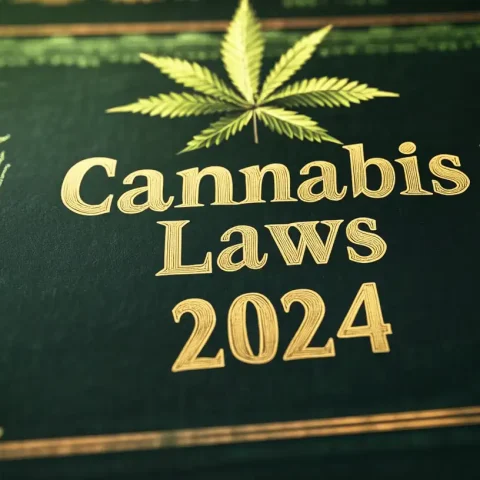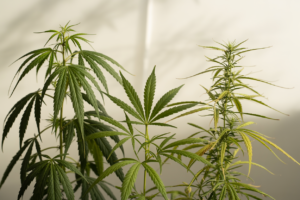- Latest laws, dispensary licenses & weed tourism rules in Bangkok & beyond
Thailand Cannabis Guide 2024: Medical, Business & Tourism

Contents
Contents
Introduction to Thailand Cannabis Legislation
Since 2022, Thailand’s cannabis laws have changed significantly, making it the first country in Asia to decriminalize cannabis. Previously, Thailand had some of the strictest drug laws in the region, but on June 9, 2022, it became a regional leader in cannabis reform. This major shift aimed to boost the medical and wellness sectors and create new opportunities for economic growth.
Since this change, Thailand’s cannabis industry has expanded rapidly. Currently, there are more than 9,400 cannabis businesses registered across the country, contributing substantially to the economy, with the market valued at approximately 28.1 billion baht (with expectations for continued growth, potentially reaching 43 billion baht by 2025). However, public concerns about cannabis being easily accessible to minors and the risks of recreational misuse have led to renewed debates on regulation. In response, the government introduced stricter rules to control recreational use while still allowing medical and industrial applications.
These new rules indicate that Thailand is attempting to balance the economic benefits of a growing cannabis industry with the need for public health and safety. As of 2024, Prime Minister Srettha Thavisin’s administration has proposed further regulations focused on medical use and stricter business compliance. Thailand continues to refine its policies, attracting considerable attention from both domestic and international observers as it positions itself as a case study for cannabis legislation in Southeast Asia.
Quick Facts
- Decriminalization Date: June 9, 2022
- Licensed Businesses: Over 9,400
- Market Size: 28.1 billion baht
- Current Legal Status: Medical and limited industrial use allowed; recreational use restricted
Current Legal Status of Cannabis in Thailand
Thailand uses a two-track approach to regulate cannabis: one for medical/industrial use and another for recreational use.
Medical Cannabis Framework
Medical cannabis is legal under these conditions:
- A prescription from a licensed doctor is required.
- Available through registered dispensaries.
- THC content must be less than 0.2%.
- Patients must be registered in a government-approved system.
Industrial Cannabis Regulations
Cannabis can be used for industrial purposes, including:
- Making textiles and cosmetics with THC levels below 0.2%.
- Use in food supplements, with THC content not exceeding 0.3%.
- Research and development under regulatory compliance.
- Licenses are required, and businesses must meet quality control standards.
Current Restrictions
Recreational use of cannabis has strict limitations:
- It is not allowed in public spaces.
- Sales to individuals under 20 years of age are prohibited.
- THC levels are capped at 0.2% for all cannabis products.
- Smoke-free zones, like schools and parks, have stricter rules.
Enforcement Framework
If someone breaks the rules, the penalties include:
- Fines: Between 20,000 and 60,000 baht.
- Imprisonment: Up to one year for repeat offenders.
- License Revocation: Businesses can lose their licenses for non-compliance.
Legal Status Quick Reference
- Medical Use: Legal with a prescription.
- Industrial Use: Legal with a license.
- Recreational Use: Restricted.
- Hemp Products: Legal within THC limits.
New Cannabis Regulations Thailand
Executive Summary
In 2024, Thailand will introduce several changes to its cannabis rules, focusing on stricter controls for recreational use, tighter regulations for medical cannabis, and new licensing measures for businesses. The goal is to balance economic opportunities with public safety.
Key Changes Timeline
- Q1 2024: Stricter guidelines for prescribing medical cannabis.
- Q2 2024: Full ban on recreational cannabis in public spaces.
- Q3 2024: Increased compliance checks for cannabis businesses.
- Q4 2024: Mandatory renewal of all licenses under updated requirements.
Recreational Use Changes
- Public Consumption Ban: Recreational use in public spaces is banned, including schools and parks.
- Age and Access Restrictions: Recreational cannabis cannot be sold to individuals under 20, pregnant women, or breastfeeding mothers.
- Enforcement Methods: Surveillance cameras in smoke-free zones and public reporting through a government hotline.
- Penalties: Fines up to 60,000 baht or imprisonment for unauthorized use.
Medical Cannabis Framework
- Doctor Certification: Only doctors with specialized training can prescribe cannabis.
- Qualifying Conditions: Chronic pain, chemotherapy-induced nausea, and similar conditions.
- Prescription Limits: THC levels capped at 0.2%, with prescriptions covering no more than 30 days.
- International Patients: Foreign patients must provide medical records and register to use medical cannabis.
Business Compliance Updates
- Application Procedures: Businesses must submit operational plans, including quality control and waste management.
- Licensing Fees: Fees range from 50,000 to 200,000 baht depending on business type.
- Required Documentation: Proof of ownership, tax registration, and THC compliance.
- Inspection Schedules: Quarterly inspections to ensure compliance.
Penalty Comparison
📋 Public Use
━━━━━━━━━━━━━━━━━━━━
Previous Fine: ฿20,000
New Fine (2024): ฿60,000
Previous Term: 6 months
New Term (2024): 1 year
📋 Sales to Minor
━━━━━━━━━━━━━━━━━━━━
Previous Fine: ฿15,000
New Fine (2024): ฿50,000
Previous Term: 3 months
New Term (2024): 6 months
📋 Unauthorized Export
━━━━━━━━━━━━━━━━━━━━
Previous Fine: ฿30,000
New Fine (2024): ฿80,000
Previous Term: 1 year
New Term (2024): 2 years
License Categories
🏷️ Medical License
━━━━━━━━━━━━━━━━━━━━
THC Limit: 0.2%
Fee: ฿50,000
Requirements:
- Doctor certification
- Patient logs
Processing: 30 days
🏷️ Industrial License
━━━━━━━━━━━━━━━━━━━━
THC Limit: 0.3%
Fee: ฿100,000
Requirements:
- Quality control systems
- Regular inspections
Processing: 45 days
🏷️ Research License
━━━━━━━━━━━━━━━━━━━━
THC Limit: 0.3%
Fee: ฿75,000
Requirements:
- Institutional approval
- Safety protocols
Processing: 60 days
Implementation Guidelines
For Businesses
- License Renewal: Must be completed by Q4 2024.
- Compliance Checklist: Train staff, install safety equipment, maintain records.
For Medical Practitioners
- Certification Requirements: Register with the Ministry of Public Health and complete training.
- Prescription Rules: Only for qualifying conditions.
For Consumers
- Rights and Restrictions: Medical cannabis available only from registered dispensaries, consumption allowed only in private residences.
FAQs: Thailand Cannabis Update
Legal Status & Timeline
Implementation Timeline
Q: When do the new Thailand cannabis regulations take effect?
A: The regulations will be implemented in phases:
- Q1 2024: Initial guidelines and business registration
- Q2 2024: Full implementation of new restrictions
- Q3-Q4 2024: Grace period for business compliance
- December 31, 2024: Final deadline for full compliance
Current Legal Framework
Q: What is the current legal status of cannabis in Thailand?
A: As of 2024:
- ✓ Medical use: Legal with prescription
- ✓ Industrial use: Legal with proper licensing
- ✓ Hemp products: Legal (THC < 0.2%)
- ✕ Recreational use: Restricted
- ✕ Public consumption: Prohibited
Medical Cannabis
Q: How can I legally obtain medical cannabis in Thailand?
A: Legal access requires:
- Valid prescription from licensed Thai doctor
- Registration with Ministry of Public Health
- Purchase from authorized dispensaries only
- Proper documentation of medical condition
- Regular renewal of medical registration
Q: What medical conditions qualify for cannabis treatment?
A: Approved conditions include:
- Chronic pain
- Cancer-related symptoms
- Epilepsy
- Multiple sclerosis
- Parkinson’s disease
- Alzheimer’s disease
- Anxiety and depression (with specialist approval)
- Other conditions as approved by qualified physicians
Business Operations
Q: What licenses are available for cannabis businesses?
A: Available licenses include:
- Medical dispensary license
- Cultivation license
- Processing license
- Research license
- Import/export license
- Distribution license
Each license has specific:
- Application requirements
- Fee structure
- Compliance standards
- Renewal periods
Q: What are the business compliance requirements?
A: Businesses must maintain:
- Quality control systems
- Security protocols
- Staff training programs
- Record-keeping systems
- Regular testing procedures
- Waste management plans
Penalties and Enforcement
Q: What are the penalties for cannabis law violations?
A: Penalties vary by offense:
📋 Public Use
- First offense: ฿20,000 fine
- Repeat offense: ฿60,000 fine + possible imprisonment
- Commercial spaces: Additional penalties apply
📋 Unauthorized Sales
- Base fine: ฿50,000
- Sales to minors: ฿100,000 + mandatory jail time
- License revocation for businesses
📋 Cultivation Violations
- Unlicensed growing: ฿40,000-80,000
- THC limit violations: ฿30,000-50,000
- Documentation failures: ฿20,000-40,000
International Visitors
Q: Can tourists access cannabis in Thailand?
A: Tourist guidelines:
- Medical use: Allowed with proper documentation
- Must register with Ministry of Public Health
- Cannot import cannabis products
- Must follow all local restrictions
- Limited to authorized dispensaries
Q: Can I travel with my medical cannabis prescription?
A: International travel rules:
- Cannot bring cannabis into Thailand
- Cannot export cannabis from Thailand
- Must obtain new prescription in Thailand
- Must register with local authorities
Practical Guidelines
Q: How is cannabis testing and quality control managed?
A: Quality control requirements:
- Regular laboratory testing
- THC content verification
- Contaminant screening
- Batch tracking
- Documentation requirements
Q: What documentation should I maintain?
A: Required documents:
- Medical prescriptions
- Purchase receipts
- Registration cards
- Test results (for businesses)
- Compliance records
Updates and Changes
Q: How can I stay informed about regulation changes?
A: Stay updated through:
- Official government websites
- Licensed dispensary notifications
- Industry associations
- Ministry of Public Health announcements
- Regular compliance updates
Additional Resources
📚 Useful Links
⚠️ Important Notice
This FAQ is updated as of 29.10.24. Regulations may change. Always verify current rules with official sources.
Business Impact of Thailand’s New Cannabis Laws
The 2024 cannabis regulations are expected to significantly impact Thailand’s cannabis sector. Stricter compliance requirements will lead to increased operational costs for businesses. Quarterly inspections and increased documentation will require more investment in compliance.
On the other hand, tighter regulations could increase consumer trust and enhance the legitimacy of the industry. Businesses that comply may benefit from a more stable market and reduced competition from unregulated operators. While new regulations introduce challenges, they are expected to create a more structured cannabis market in Thailand, ultimately benefiting compliant businesses.
Tourist Guidelines on Cannabis in Thailand
Tourists in Thailand must follow strict cannabis guidelines. Recreational use is prohibited, and tourists should avoid using cannabis in public areas due to severe fines or imprisonment. Consumption is only allowed in private residences, and public places such as parks, schools, and transportation hubs are strictly off-limits.
Tourists may access medical cannabis if they meet certain requirements. Foreigners must present valid medical documentation and register with the Ministry of Public Health. Only registered dispensaries can sell cannabis products, with THC levels tightly regulated. Importing cannabis without permission is illegal.
Political and Social Implications of New Cannabis Laws
The new cannabis regulations in Thailand have significant political and social implications. Politically, the shift reflects the government’s attempt to balance economic opportunities with public health concerns. The cannabis industry has become an important source of economic growth, contributing to job creation and generating tax revenue. At the same time, the government faces pressure from conservative groups concerned about recreational misuse.
Stricter recreational controls aim to foster public trust while maintaining economic benefits. The focus on medical cannabis helps destigmatize the plant, presenting it as a legitimate therapeutic option rather than just a recreational drug. However, strict penalties for misuse serve as a reminder of ongoing societal challenges. The government aims to foster a responsible cannabis culture in Thailand.
Future of Cannabis in Thailand
The future of cannabis in Thailand will likely see continued changes as the country balances economic, regulatory, and public health needs. The 2024 framework aims to create a sustainable cannabis industry, encouraging medical and industrial uses while strictly controlling recreational consumption.
Economically, the cannabis sector has potential for growth, particularly in exporting medical and industrial cannabis products. Socially, cannabis is gaining recognition for its therapeutic value, though recreational use remains restricted. The government will continue fostering a responsible cannabis culture focused on safe, regulated medical use.
Key Takeaways
- Historic Transformation: Thailand decriminalized cannabis in 2022, aiming to boost medical and wellness sectors.
- Stricter Regulations in 2024: New rules focus on controlling recreational use while supporting medical and industrial uses.
- Medical Use Focus: Cannabis is legal for medical purposes, with strict requirements for doctors, dispensaries, and patients.
- Economic Impact: The new regulations present challenges but also opportunities for a more stable and trustworthy cannabis market.
Conclusion
Thailand’s cannabis laws have undergone significant changes since 2022, positioning the country as a pioneer in cannabis regulation within Asia. The upcoming 2024 regulations will tighten controls over recreational use while enhancing safety and compliance in medical and industrial applications. These changes reflect the government’s commitment to balancing economic growth with public health and safety.
For businesses, these new regulations present both challenges and opportunities. Companies that adapt and comply effectively will benefit from a more structured industry with increased consumer trust. Socially, the emphasis on medical cannabis will continue to reduce stigma, paving the way for broader acceptance of cannabis as a legitimate therapeutic option.
Disclaimer:The information provided here is for general knowledge only. The laws regarding cannabis in Thailand may change over time, so it is important to stay informed through official government channels or consult a legal expert.
Subscribe to Our Newsletter: Stay updated on Thailand’s cannabis regulations, market trends, and more. Subscribe to our newsletter for the latest news and insights directly to your inbox!




